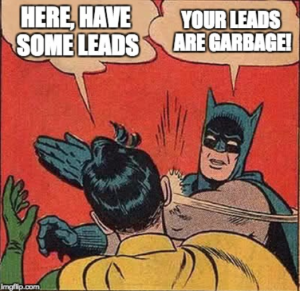
01 Dec Marketing vs. Sales: Who’s to Blame for Stalled Growth?
Do your sales and marketing teams get along? Are they working for the betterment of the entire organization? Or are they striving for their own personal gain and glory?
In most companies I’ve consulted with, when senior leadership doesn’t see the results it wants, a blame game emerges.

For example, I’ve heard sales leadership announce things like:
“The quality of leads we’re getting is terrible. Why call on these leads when they aren’t even interested?”
“If only marketing could provide us with some better materials to close deals.”
“Not enough leads coming in.”
On the flip side, marketers chime in with:
“They call these leads once and give up.”
“We’ve done the research, the testing. The sales guys don’t see the big picture and aren’t selling it right.”
“Sounds like sales is more concerned with pleasing people than selling products.”
So who is really at fault for lack of results? Who is the loser in the blame game?

Well, if Blame is the name of the game, then everyone loses.
For an organization to successfully grow, sales and marketing team alignment is critical. They need to get on the same page, communicate well, and earn success as one.
To quote Jack from the TV show, Lost: “If we can’t live together, we’re going to die alone.”
Here are a couple of reasons why there’s a great divide between sales and marketing and what you can do to bridge it.
Company Politics and a House Divided
Sales and marketing teams are often measured against completely separate goals instead of one singular achievement. This encourages competition instead of collaboration.
I once observed a company who was lost to politics—individual employees or teams cared more about themselves than the overall success of the organization itself.
The sales team was responsible for revenue, while marketing was accountable for delivering qualified leads. When the sales team came up short, they blamed marketing for the lack of leads. Marketing pointed back by saying the leads were fine but the outreach was lacking. This back-and-forth negatively affected the culture and performance of the company.
In companies that are more collaborative, there is one revenue target for sales and marketing. No one hits their goal unless the company hits its goal. Sales and marketing success depend on the two teams working together to carve the best pathway for company growth. When in sync, sales and marketing are 67% better at closing deals, generate 208% more revenue from marketing, and enjoy up to 3X revenue growth (B2B Lead, Marketing Profs, Bulldog Solutions).
What We’ve Got Here is Failure to Communicate
Forced, once-a-week meetings aren’t nearly enough to bridge the sales and marketing divide. The most successful companies I’ve witnessed have sales and marketing teams who speak with each other regularly. They collaborate on phone calls, lead quality, and stall reasons.
Good communication between teams helps them both understand each other’s role. It also provides a feedback loop where the individual team can see where improvements are needed.
Generally speaking, sales and marketing teams can benefit from understanding the ins and outs of the other team. How well does a salesperson understand marketing automation? What does a marketer know about talking points and sales conversations?
Open yourselves up and learn from each other through working sessions, lunches, and just plain talking. Great ideas will emerge when marketing and sales are talking to each other.
How to Bridge the Sales and Marketing Divide
While sales is the primary bringer of deals, marketing too can bring in ready-made deals. By the same token, sales usually drives early growth before marketers come on to scale it.

One team isn’t more important than the other. Sales and marketing are most effective working together and in complete alignment. Achieving alignment starts with the leadership and the direction it provides. And that leadership comes from seeing the big picture, identifying stall reasons, incorporating better processes, and instilling a culture of collaboration, not competition.
Sorry, the comment form is closed at this time.